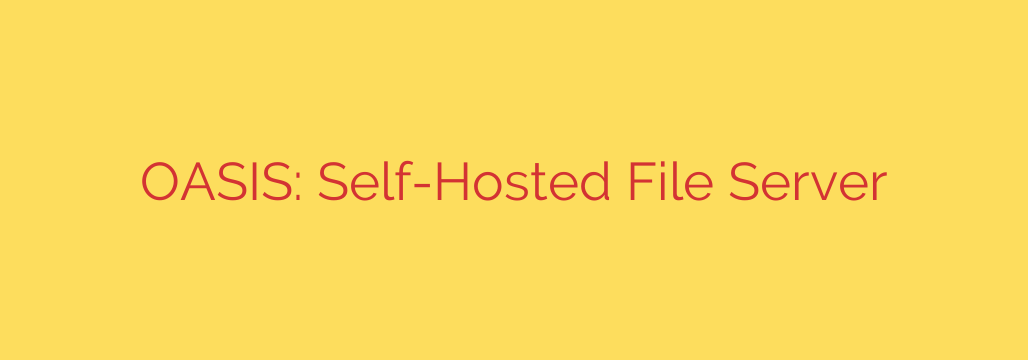
Take Back Control of Your Data with a Self-Hosted File Server
In an era where our digital lives are increasingly managed by large tech companies, the question of data ownership has never been more critical. Services like Google Drive, Dropbox, and iCloud offer convenience, but it comes at a cost: your privacy and control. The solution for those who value digital sovereignty is clear—a self-hosted file server. This approach allows you to create your own private cloud, and modern tools like OASIS make it more accessible than ever.
By moving your files to a server you own and operate, you transform from a user into a true owner of your digital assets. This isn’t just about storage; it’s about taking a fundamental step toward securing your personal and professional information.
Why You Should Consider Self-Hosting Your Files
Opting out of third-party cloud services in favor of your own server provides immediate and significant benefits. If you’re tired of subscription fees, privacy policies that change on a whim, and questions about who can access your data, self-hosting is the definitive answer.
Here are the primary advantages:
Unparalleled Privacy and Control: When you host your own files, you are the sole administrator. You decide who has access, how data is managed, and where it is physically located. There are no third-party scans of your content for advertising purposes and no risk of your account being suspended without warning. Your data remains completely private.
Cost-Effectiveness Over Time: While there is an initial hardware investment—which can be as low as the cost of a Raspberry Pi or a used computer—self-hosting eliminates recurring monthly subscription fees. As your storage needs grow, you can simply add more hard drives, a far more affordable solution than upgrading a cloud storage plan in the long run.
Complete Customization and Flexibility: A self-hosted solution is your digital sandbox. You can set up user accounts for family members or colleagues, allocate specific storage quotas, and integrate other self-hosted services. You are not limited by the features or restrictions of a commercial provider.
Introducing OASIS: A Secure, Modern File Server
OASIS is an open-source, self-hosted file server designed with security and simplicity at its core. It provides a clean, web-based interface for uploading, downloading, and managing your files from any device with a browser, effectively creating your personal, secure Dropbox alternative.
What makes OASIS a compelling choice for your private cloud?
End-to-End Encryption: Security is its main feature. OASIS uses robust end-to-end encryption, meaning your files are encrypted on your device before they are even sent to the server. Only you, with your password, can decrypt them. Even someone with physical access to the server’s hard drives cannot read your data.
Intuitive Web Interface: You don’t need to be a command-line expert to use it. The user interface is clean and straightforward, making file management as easy as any commercial cloud service.
Efficient User and Group Management: Whether for a family or a small team, you can easily create and manage multiple user accounts. Organize users into groups to grant shared access to specific folders, simplifying collaboration without compromising individual privacy.
Simple Deployment with Docker: Getting started is remarkably easy for those familiar with Docker. OASIS is distributed as a Docker image, allowing you to launch a fully functional server with a single, simple command. This container-based approach isolates the application and streamlines updates.
Essential Security Tips for Your Self-Hosted Server
Running your own server means you are also in charge of its security. While OASIS provides a secure foundation with encryption, securing the server itself is crucial for protecting your data from external threats.
Here are actionable security practices you should implement:
Use a Reverse Proxy with SSL: Never expose your file server directly to the internet. Set up a reverse proxy (like Nginx Proxy Manager or Traefik) to handle incoming traffic and manage SSL/TLS certificates. This encrypts the connection between your browser and the server, protecting your login credentials and data in transit.
Keep Your System Updated: Regularly update your server’s operating system, the Docker engine, and the OASIS container itself. Software updates frequently contain critical security patches that protect against newly discovered vulnerabilities.
Implement a Firewall: Configure a firewall (such as UFW on Linux) to block all unnecessary ports. Only allow traffic on the ports required for your services (typically port 80 for HTTP and 443 for HTTPS).
Perform Regular Backups: Your data’s safety is paramount. Adopt a robust backup strategy, such as the 3-2-1 rule (three copies of your data, on two different media, with one copy off-site). A hardware failure should not result in a catastrophic loss of your important files.
By embracing a self-hosted solution like OASIS, you are not just setting up a file server—you are building a private, secure, and independent digital home. It’s a powerful step toward reclaiming your privacy and ensuring your most valuable data remains firmly in your control.
Source: https://www.linuxlinks.com/oasis-self-hosted-file-server/








